For more information:
Note that the latest stuff may not yet be indexed.
The Klezmer Shack directory of articles
The Top 10 or so: Best recordings of 2000
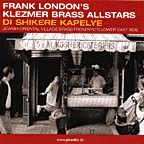 This year's list is bracketed by two extraordinary Frank London recordings. The first, Frank London's Klezmer Brass Allstars / Di Shikere Kapelye is such a perfect realization of a balkan village band playing klezmer that I may never put it away. If you're a fan of the soundtrack to the movie "Underground," or if you've got everything ever recorded by Zlatne Uste (or better yet, any of a long list of amazing bands actually resident in the Balkans of similar quality) or love New Orleans brass, this is essential.
This year's list is bracketed by two extraordinary Frank London recordings. The first, Frank London's Klezmer Brass Allstars / Di Shikere Kapelye is such a perfect realization of a balkan village band playing klezmer that I may never put it away. If you're a fan of the soundtrack to the movie "Underground," or if you've got everything ever recorded by Zlatne Uste (or better yet, any of a long list of amazing bands actually resident in the Balkans of similar quality) or love New Orleans brass, this is essential.
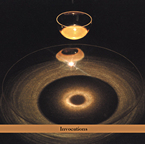 What blows my mind, though, and makes me want to declare this the "year of Frank London" is how many projects this person is involved with--Nigunim, Hasidic New Wave, the Klezmatics, Shekhinah, and most notably, out just the past month, an ethereal, perfect--almost the opposite of village funk--recording of cantorial music, set for trumpet. To listen to the latest album, "Invocations" is to be transported. And, although people who love cantorial music love this new album, I think the opposite is going to be even more true: people who listen to this album will find themselves exploring Jewish Cantorial Music afresh, from the great Cantorial and Operatic stars of Ashkenazic tradition, to Emil Zrihan and the great Sephardic cantors. People who know Jewish music start with Cantorial traditions, and, indeed, there is a myth that Cantorial music comes to us from the melodies of the Temple. Certainly, at a time when the average synagogue congregation is more familiar with Debbie Friedman and "summer camp" melodies, reawakening interest in great Jewish Cantorial traditions is a very, very good thing, and a very important reconnection with our traditions. Besides, did I mention how starkly soulful this album is? Accompanied very lightly by accordion, glass harmonica, and the like, this is primarily soaring, davening trumpet, and a deeply felt refreshment to both ears and to spirit. In mentioning this latter Frank London project I also note an earlier release this year, Shekhinah, and other excellent explorations of religious music traditions this year including Uri Caine's Keter project, Pharaoh's Daugher, and Anthony Coleman (with Basya Schaechter of Pharaoh's Daugher, along with many others) in "The Music of Shabbat at Bnai Jeshurun."
What blows my mind, though, and makes me want to declare this the "year of Frank London" is how many projects this person is involved with--Nigunim, Hasidic New Wave, the Klezmatics, Shekhinah, and most notably, out just the past month, an ethereal, perfect--almost the opposite of village funk--recording of cantorial music, set for trumpet. To listen to the latest album, "Invocations" is to be transported. And, although people who love cantorial music love this new album, I think the opposite is going to be even more true: people who listen to this album will find themselves exploring Jewish Cantorial Music afresh, from the great Cantorial and Operatic stars of Ashkenazic tradition, to Emil Zrihan and the great Sephardic cantors. People who know Jewish music start with Cantorial traditions, and, indeed, there is a myth that Cantorial music comes to us from the melodies of the Temple. Certainly, at a time when the average synagogue congregation is more familiar with Debbie Friedman and "summer camp" melodies, reawakening interest in great Jewish Cantorial traditions is a very, very good thing, and a very important reconnection with our traditions. Besides, did I mention how starkly soulful this album is? Accompanied very lightly by accordion, glass harmonica, and the like, this is primarily soaring, davening trumpet, and a deeply felt refreshment to both ears and to spirit. In mentioning this latter Frank London project I also note an earlier release this year, Shekhinah, and other excellent explorations of religious music traditions this year including Uri Caine's Keter project, Pharaoh's Daugher, and Anthony Coleman (with Basya Schaechter of Pharaoh's Daugher, along with many others) in "The Music of Shabbat at Bnai Jeshurun."
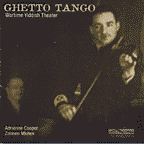 One of the year's most remarkable recordings is Ghetto Tango, featuring Zalmen Mlotek and Adrienne Cooper. At its core, it is a cabaret recreation of many songs sung in the Jewish Ghettoes during WWII. There are included here some of the more moving and familiar songs which we know from the Holocaust. But there is much more. This is an album about human spirit and about resistance. It is an album that reminds us that not all human resistance makes page one of the history books, much of the heroism lay in daily resistance, and in the ability to poke fun in the face of starvation, disease, and sudden death. The most moving numbers are the bar mitzvah song, or the Rikshaw song, or the eternal, Brechtian "Mues" (Money). Nor does the album lack overt Brecht-Weill. Weill, too, was a Jew of the period, and one already known for writing music that helped poke fun at oppression. There is so much depth to this album. Cooper's voice, as I have found myself writing over and over and over through the years is so perfect, as is her ability to remain true to the Yiddish while also making the English apparent, either by including enough English lyric to tell the bare bones of the story, or by introducing it. And Mlotek's arrangements and accompaniments (and vocals!) show him at his best. Better than his best. In Mlotek's hand, the piano accompanies, but is also there with a sly comment at the right time, and is there to support the voices, always, and just right. In Mlotek's hands, one doesn't even notice accompaniment until one listens for it, because it is so well fused with the vocals and with the stories of the songs.
One of the year's most remarkable recordings is Ghetto Tango, featuring Zalmen Mlotek and Adrienne Cooper. At its core, it is a cabaret recreation of many songs sung in the Jewish Ghettoes during WWII. There are included here some of the more moving and familiar songs which we know from the Holocaust. But there is much more. This is an album about human spirit and about resistance. It is an album that reminds us that not all human resistance makes page one of the history books, much of the heroism lay in daily resistance, and in the ability to poke fun in the face of starvation, disease, and sudden death. The most moving numbers are the bar mitzvah song, or the Rikshaw song, or the eternal, Brechtian "Mues" (Money). Nor does the album lack overt Brecht-Weill. Weill, too, was a Jew of the period, and one already known for writing music that helped poke fun at oppression. There is so much depth to this album. Cooper's voice, as I have found myself writing over and over and over through the years is so perfect, as is her ability to remain true to the Yiddish while also making the English apparent, either by including enough English lyric to tell the bare bones of the story, or by introducing it. And Mlotek's arrangements and accompaniments (and vocals!) show him at his best. Better than his best. In Mlotek's hand, the piano accompanies, but is also there with a sly comment at the right time, and is there to support the voices, always, and just right. In Mlotek's hands, one doesn't even notice accompaniment until one listens for it, because it is so well fused with the vocals and with the stories of the songs.
Many people either purchase recordings of music from the Holocaust because they refuse to forget, and will purchase almost any new recording. This one is different, and I wonder how it will be received--well, and perhaps changing the standard, I hope. The people who need to hear this album, however, are those who avoid such purchases, perhaps because they feel that they "know enough", or perhaps because they have no need to participate in the further marketing of tragedy. Some might miss the album simply because it isn't rock and roll or pop, or even klezmer. In this case, the latter would lose doubly: they would lose the music, which in this particular case far transcends genre, but they would also lose the return of our sense of the Holocaust to the individual, the human, and our greater understanding of the extent of our loss once we re-enter the particular. To be reminded of humanity at its best, reacting to humanity at its worst, is no small thing. This is such a beautiful, deep recording, worth listening to at all levels, but especially, as a memorial to those who were taken from us, and the resurrection of a few of their voices in our time. This is the essential recording of 2000.
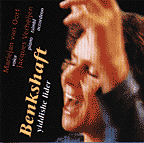 In the first iteration of this page, I somehow lost the listing for one of the year's best recordings, the new CD featuring the singing of Mariejan van Oort, accompanied by Jacques Verheijen, "Benkshaft." It is especially lovely to have the opportunity to list it following Adrienne Cooper's new CD, as Cooper is the only current vocalist who compares to van Oort in Yiddish song. Or, van Oort is the only new Yiddish vocalist who approaches Cooper's skill. Although this second album by van Oort and Verheijen even goes so far as to feature the Benkshaft String Quartet on one track, the music is still primarily van Oort's amazing voice, and Verheijen's amazing accompaniment. This isn't the sort of music that will get a lot of airplay--it isn't overblown, much less "sufficiently" overblown to appeal to people who think that Yiddish Film music is the acme of Yiddish song, and it isn't avant garde. It's simply wonderful, listenable music, sung as though the words were meant to be heard and felt. Like the Cooper-Mlotek collaboration, above, or David Wall and the Flying Bulgars (below), or, Chava Alberstein's recent collaboration with the Klezmatics, this album is an essential proof that Yiddish is alive, well, and essential to the human condition.
In the first iteration of this page, I somehow lost the listing for one of the year's best recordings, the new CD featuring the singing of Mariejan van Oort, accompanied by Jacques Verheijen, "Benkshaft." It is especially lovely to have the opportunity to list it following Adrienne Cooper's new CD, as Cooper is the only current vocalist who compares to van Oort in Yiddish song. Or, van Oort is the only new Yiddish vocalist who approaches Cooper's skill. Although this second album by van Oort and Verheijen even goes so far as to feature the Benkshaft String Quartet on one track, the music is still primarily van Oort's amazing voice, and Verheijen's amazing accompaniment. This isn't the sort of music that will get a lot of airplay--it isn't overblown, much less "sufficiently" overblown to appeal to people who think that Yiddish Film music is the acme of Yiddish song, and it isn't avant garde. It's simply wonderful, listenable music, sung as though the words were meant to be heard and felt. Like the Cooper-Mlotek collaboration, above, or David Wall and the Flying Bulgars (below), or, Chava Alberstein's recent collaboration with the Klezmatics, this album is an essential proof that Yiddish is alive, well, and essential to the human condition.
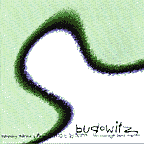 When I was in Europe a few years ago, I discovered Josh Horowitz, and several other musicians who were spending part of the year wandering villages and collecting music, and the rest of the year playing, teaching, and transcribing. Josh's then-new band, Budowitz, subsequently released "Mother Tongue," an album that introduced an entirely new way of thinking about klezmer to the world. I loved the album, but still found it somewhat stiff. On the latest outing, the first CD-length recording of the once-thought-lost music for an entire, week-long traditional Jewish wedding, that stiffness is gone. In "Wedding without a Bride, the current Budowitz ensemble proves itself facile and fun even beyond the original. Yet, most of this is not dance music. It is music to accompany other parts of the wedding. It is, sometimes, music to listen to, and sometimes, music on which to reflect. And it is now part of the common repertoire, again, thanks to Josh's scholarship and some amazing musicians, of which Professor Horowitz is at the front. Just listen to his tsimbl piece around track 19? 18? In heaven, music will always sound this good. Oh, and did I mention the liner notes? Reading Horowitz-penned commentary, scholarship dipped in much wit and a touch of acid, is almost as good as having the music, itself. The notes about figuring out the wedding material posted originally to the Jewish music mailing list, are now also online.I am also pleased to report that, despite earlier distribution problems, the CD should be readily available at all US music emporia.
When I was in Europe a few years ago, I discovered Josh Horowitz, and several other musicians who were spending part of the year wandering villages and collecting music, and the rest of the year playing, teaching, and transcribing. Josh's then-new band, Budowitz, subsequently released "Mother Tongue," an album that introduced an entirely new way of thinking about klezmer to the world. I loved the album, but still found it somewhat stiff. On the latest outing, the first CD-length recording of the once-thought-lost music for an entire, week-long traditional Jewish wedding, that stiffness is gone. In "Wedding without a Bride, the current Budowitz ensemble proves itself facile and fun even beyond the original. Yet, most of this is not dance music. It is music to accompany other parts of the wedding. It is, sometimes, music to listen to, and sometimes, music on which to reflect. And it is now part of the common repertoire, again, thanks to Josh's scholarship and some amazing musicians, of which Professor Horowitz is at the front. Just listen to his tsimbl piece around track 19? 18? In heaven, music will always sound this good. Oh, and did I mention the liner notes? Reading Horowitz-penned commentary, scholarship dipped in much wit and a touch of acid, is almost as good as having the music, itself. The notes about figuring out the wedding material posted originally to the Jewish music mailing list, are now also online.I am also pleased to report that, despite earlier distribution problems, the CD should be readily available at all US music emporia.
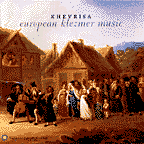 I could begin talking about Khevrisa's debut album, "European Klezmer Music," many ways. Here's what I said last time I wrote about the album. Next, consider the principals in the band. I first met violinist Steven Greenman several years ago, having flown into Toronto on a junket that allowed me to catch a live recording of the third Flying Bulgars album, "Fire". He was this dimunitive, friendly guy who played fiddle like a wizard. One could hear why the sort of recording that would pull in Adrienne Cooper from NYC, might also reach to Cleveland for Greenman. But the story of this album begins back in the late 1970s when avant garde bluegrass wizard Andy Statman put out an album with Zev Feldman. The latter played tsimbl, an instrument unfamiliar to most of us, but ethereal and beautiful. It was the album that, for many of us, first made apparent that there was real yikhes to this klezmer thing. "Jewish Klezmer Music," (our "rerelease of the year"--it's back in print just this year as SHANACHIE 21002) taking its name from Moshe Beregovski's description of Jewish folk instrumental music. (Until that time, an itinerant Jewish musician was a "klezmer," but the music was just ... music, or "Jewish folk instrumental music" if you wanted to be formal, as Beregovski was.) Twenty years later, Feldman, joining with the now-mature Greenman, releases the second installment of music, this time, as Khevrisa, and titling it, "European Jewish Music." In this album, the two, backed by several all-star klezmorim, explore the music that European Klezmorim played when they weren't at weddings: the music they played to show that they were every bit as good as the classical musicians with whom the best of them competed.
I could begin talking about Khevrisa's debut album, "European Klezmer Music," many ways. Here's what I said last time I wrote about the album. Next, consider the principals in the band. I first met violinist Steven Greenman several years ago, having flown into Toronto on a junket that allowed me to catch a live recording of the third Flying Bulgars album, "Fire". He was this dimunitive, friendly guy who played fiddle like a wizard. One could hear why the sort of recording that would pull in Adrienne Cooper from NYC, might also reach to Cleveland for Greenman. But the story of this album begins back in the late 1970s when avant garde bluegrass wizard Andy Statman put out an album with Zev Feldman. The latter played tsimbl, an instrument unfamiliar to most of us, but ethereal and beautiful. It was the album that, for many of us, first made apparent that there was real yikhes to this klezmer thing. "Jewish Klezmer Music," (our "rerelease of the year"--it's back in print just this year as SHANACHIE 21002) taking its name from Moshe Beregovski's description of Jewish folk instrumental music. (Until that time, an itinerant Jewish musician was a "klezmer," but the music was just ... music, or "Jewish folk instrumental music" if you wanted to be formal, as Beregovski was.) Twenty years later, Feldman, joining with the now-mature Greenman, releases the second installment of music, this time, as Khevrisa, and titling it, "European Jewish Music." In this album, the two, backed by several all-star klezmorim, explore the music that European Klezmorim played when they weren't at weddings: the music they played to show that they were every bit as good as the classical musicians with whom the best of them competed.
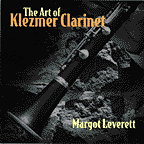 Having gotten everyone all worked up, I will now include two recordings in my list that, technically, came out in 1999, but which I reviewed this past year. First, of course, is Margot Leverett's "The Art of Klezmer Clarinet." At a time when traditional American klezmer is what everyone plays, rather well, but not memorably, Leverett reminds us how great those early American Klezmorim were, and finally showcases her considerable talent at showcasing the music at its best. Since she also chose to highlight the music of Shloimke Beckerman (whose son, Sid, has been an invaluable fixture at Klezcamp and a major mensh), we also get to hear less familiar music of the first part of this century, and we get to hear it under ideal conditions: an exceptional soloist backed by some of the best Klezmorim playing today. Did I mention that many of the musicians backing her live in Boston, my new home town? Is there a connection? I think so!
Having gotten everyone all worked up, I will now include two recordings in my list that, technically, came out in 1999, but which I reviewed this past year. First, of course, is Margot Leverett's "The Art of Klezmer Clarinet." At a time when traditional American klezmer is what everyone plays, rather well, but not memorably, Leverett reminds us how great those early American Klezmorim were, and finally showcases her considerable talent at showcasing the music at its best. Since she also chose to highlight the music of Shloimke Beckerman (whose son, Sid, has been an invaluable fixture at Klezcamp and a major mensh), we also get to hear less familiar music of the first part of this century, and we get to hear it under ideal conditions: an exceptional soloist backed by some of the best Klezmorim playing today. Did I mention that many of the musicians backing her live in Boston, my new home town? Is there a connection? I think so!
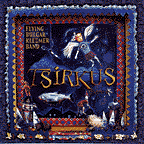 Also released in 1999, but not really listened to me until this year is "Tsirkus," the fabulous fourth album by Toronto's "Flying Bulgars." I will continue to aver that if this band were from New York, they would be touring with the Klezmatics, and would be as familiar to readers of these pages. But they're from Toronto, and don't get much chance to tour, or much publicity when they do. A set in Boston this year highlighted how incredibly tight, and deep in every which way the band is, but was not sold out. Embarrassing. This album is probably the point where one also looks at the band and realizes that they are not a klezmer band any more. They are a band that makes new Yiddish music. The fusion of imagination and music that has happened since vocalist David Wall (formerly, "New Bourbon Tabernacle Choir"), now deep into discovering incredible Yiddish song, with David Buchbinder's already incredible sense of how to stretch world beat into the world of klezmer--and this without mentioning the impressive rest of the band--is as exciting in its way as the direction taken by Brave Old World. This is exemplified by the band's recording of "Lomir Zikh Iberbetn" (Let's be friends again). Two other bands have recorded this, largely as a love song, this year. In Wall's hands it becomes a prayer between God and man, a spiritual joining of such power that mere "singing" seems inadequate and inappropriate a description. Of course, if existential I-Thou isn't your immediate musical need, it is worth mentioning a shitload of damn good music, klez, caribbean, and beyond, on the album, too.
Also released in 1999, but not really listened to me until this year is "Tsirkus," the fabulous fourth album by Toronto's "Flying Bulgars." I will continue to aver that if this band were from New York, they would be touring with the Klezmatics, and would be as familiar to readers of these pages. But they're from Toronto, and don't get much chance to tour, or much publicity when they do. A set in Boston this year highlighted how incredibly tight, and deep in every which way the band is, but was not sold out. Embarrassing. This album is probably the point where one also looks at the band and realizes that they are not a klezmer band any more. They are a band that makes new Yiddish music. The fusion of imagination and music that has happened since vocalist David Wall (formerly, "New Bourbon Tabernacle Choir"), now deep into discovering incredible Yiddish song, with David Buchbinder's already incredible sense of how to stretch world beat into the world of klezmer--and this without mentioning the impressive rest of the band--is as exciting in its way as the direction taken by Brave Old World. This is exemplified by the band's recording of "Lomir Zikh Iberbetn" (Let's be friends again). Two other bands have recorded this, largely as a love song, this year. In Wall's hands it becomes a prayer between God and man, a spiritual joining of such power that mere "singing" seems inadequate and inappropriate a description. Of course, if existential I-Thou isn't your immediate musical need, it is worth mentioning a shitload of damn good music, klez, caribbean, and beyond, on the album, too.
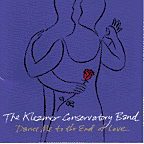 Before I forget traditional klezmer entirely, I need to mention two more relatively traditional recordings. First, the Klezmer Conservatory Band released a recording equal to, or better, than "Dancing in the Aisles" of a few years ago. "Dance me to the end of love" is an album of such absolute perfection that I find myself at a loss describing it. Listening to this album is like listening to the Epstein Brothers at their best--people who have been playing happy music for so many years that it flows, seamlessly, like a comforting pillow, all around. This is music played by people who still love, and who still love to dance. It's the sort of mature album that feels comfortable and familiar to the alte kakers in the house, but is so powerfully upbeat and exciting that even the kids will like it and want to grow up to be klezmer musicians. Or in love. (Or both!) Not a bad feeling for a band a recording whose title song is by that famous old world klezmer, Canada's Leonard Cohen!
Before I forget traditional klezmer entirely, I need to mention two more relatively traditional recordings. First, the Klezmer Conservatory Band released a recording equal to, or better, than "Dancing in the Aisles" of a few years ago. "Dance me to the end of love" is an album of such absolute perfection that I find myself at a loss describing it. Listening to this album is like listening to the Epstein Brothers at their best--people who have been playing happy music for so many years that it flows, seamlessly, like a comforting pillow, all around. This is music played by people who still love, and who still love to dance. It's the sort of mature album that feels comfortable and familiar to the alte kakers in the house, but is so powerfully upbeat and exciting that even the kids will like it and want to grow up to be klezmer musicians. Or in love. (Or both!) Not a bad feeling for a band a recording whose title song is by that famous old world klezmer, Canada's Leonard Cohen!
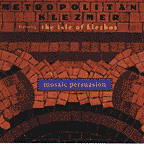 There aren't a lot of up and coming klezmer bands that get me excited. I am, in fact, turning into a bit of an old fogey. I've been there. I've seen that. I've even got t-shirts (see sidebar!). But Metropolitan Klezmer just gets better, and their new album, "Mosaic Persuasion" documents that fact. The album also introduces 'Isle of Klezbos", the all-woman klezmer band headed by Metropoitan Klezmer bandleader and drummer Eve Sicular. This is klezmer for a small club, and still worth driving from Boston to New York for. Happily, the band is getting enough publicity that they appear outside of New York sometimes, now. Even in Boston! If they don't appear soon near you, maybe it's time you should help arrange it?
There aren't a lot of up and coming klezmer bands that get me excited. I am, in fact, turning into a bit of an old fogey. I've been there. I've seen that. I've even got t-shirts (see sidebar!). But Metropolitan Klezmer just gets better, and their new album, "Mosaic Persuasion" documents that fact. The album also introduces 'Isle of Klezbos", the all-woman klezmer band headed by Metropoitan Klezmer bandleader and drummer Eve Sicular. This is klezmer for a small club, and still worth driving from Boston to New York for. Happily, the band is getting enough publicity that they appear outside of New York sometimes, now. Even in Boston! If they don't appear soon near you, maybe it's time you should help arrange it?
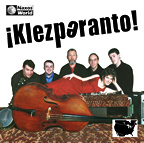 Quick! What Boston band, fronted by a famous KCB clarinetist, backed by lots of other current KCB alumni, bandmembers, and friends, has broken through the klezmer language barrier? If you guessed "Klezperanto," whose debut album starts of with some lovely balkanized fun, extends to Argentinian tango, and, a lá Brave Combo goes anywhere in the world a dance is to be had, you're absolutely correct. Is this the year's most accessible, fun, world music album with a klezmer slant? You bet? Can you purchase the CD for less ($6.95 list?--they're on the budget classical "Naxos" label) than you'd pay for a hot dog at many popular stadia? Absolutely! Would your stomach and your heart and your feet be happier with the CD, instead of the hot dog? In my humble, amateur opinion, it's not even a race. Ignore the campy cover. Go for the music, and enjoy!
Quick! What Boston band, fronted by a famous KCB clarinetist, backed by lots of other current KCB alumni, bandmembers, and friends, has broken through the klezmer language barrier? If you guessed "Klezperanto," whose debut album starts of with some lovely balkanized fun, extends to Argentinian tango, and, a lá Brave Combo goes anywhere in the world a dance is to be had, you're absolutely correct. Is this the year's most accessible, fun, world music album with a klezmer slant? You bet? Can you purchase the CD for less ($6.95 list?--they're on the budget classical "Naxos" label) than you'd pay for a hot dog at many popular stadia? Absolutely! Would your stomach and your heart and your feet be happier with the CD, instead of the hot dog? In my humble, amateur opinion, it's not even a race. Ignore the campy cover. Go for the music, and enjoy!
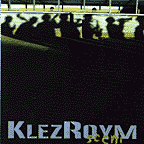 I haven't actually written full-length reviews of several of the albums on this year's list. Like Klezperanto, above, Klezroym's new "Sceni" deserves special consideration. First off, I am pleased to call attention to them simply to remind people that there is some amazing klezmer being recorded outside the United States. But in this case, I want to call special attention to Klezroym because they take the concept "klezmer jamband" to very interesting sounding places. I don't know that they would use the term to describe themselves--they're too interesting, and an order or two better than any of the recordings I've heard that have claimed the name so far. But if you were to invent the concept of people grounded in Jewish music (not necessarily klezmer) improvising and making lovely music, you'd definitely want to hear KlezRoym, and this album, even more than their first.
I haven't actually written full-length reviews of several of the albums on this year's list. Like Klezperanto, above, Klezroym's new "Sceni" deserves special consideration. First off, I am pleased to call attention to them simply to remind people that there is some amazing klezmer being recorded outside the United States. But in this case, I want to call special attention to Klezroym because they take the concept "klezmer jamband" to very interesting sounding places. I don't know that they would use the term to describe themselves--they're too interesting, and an order or two better than any of the recordings I've heard that have claimed the name so far. But if you were to invent the concept of people grounded in Jewish music (not necessarily klezmer) improvising and making lovely music, you'd definitely want to hear KlezRoym, and this album, even more than their first.
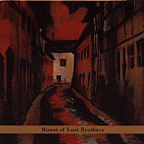 This list is already past ten, so let me quickly mention some albums that didn't get on the list, usually through fault of mine. First, it came out a couple of years ago, but this year I finally reviewed Charming Hostess' debut album, "eat". It is a very special album, and I hope it starts to get the attention it deserves. I am bemused to note how few "Radical Jewish Culture" albums made it to this list. Two recent works that would have made the list but for my not hearing them until too late are Tim Sparks' melodious, intricate "Tanz," a trio work which picks up where his solo guitar "Neshama" left off and goes further, deeper, more beautifully. Purchased just yesterday is Gary Lucas' second outing on Tzadik, "Street of Lost Brothers". In listening to him rock out on "Yigdal," and then listening to Lucas' intricate guitar, I feel I have found a spiritual brother, one who was also probably a real jerk in Hebrew School, but who never stopped wrestling with the big "what is it to me?" question. A new album is supposedly due next week, which shows how current I am (not). On the overleaf to the album he quotes TS Eliot, "Reasons of race and religion combine to make any large number of free-thinking Jews undesirable." To which he responds in print: "Tough shit, Eliot." Finally, I mention again on these pages the Anthony Coleman album, "Disco by Night", from 1993, which has stayed in the CD changer for about six months now, and I'm not giving it up yet. Although much of the material is more Balkan than Jewish (by intent--it's a response, in part, to the collapse of Yugoslavia), it is such a powerful, wonderful album. Listen to it.
This list is already past ten, so let me quickly mention some albums that didn't get on the list, usually through fault of mine. First, it came out a couple of years ago, but this year I finally reviewed Charming Hostess' debut album, "eat". It is a very special album, and I hope it starts to get the attention it deserves. I am bemused to note how few "Radical Jewish Culture" albums made it to this list. Two recent works that would have made the list but for my not hearing them until too late are Tim Sparks' melodious, intricate "Tanz," a trio work which picks up where his solo guitar "Neshama" left off and goes further, deeper, more beautifully. Purchased just yesterday is Gary Lucas' second outing on Tzadik, "Street of Lost Brothers". In listening to him rock out on "Yigdal," and then listening to Lucas' intricate guitar, I feel I have found a spiritual brother, one who was also probably a real jerk in Hebrew School, but who never stopped wrestling with the big "what is it to me?" question. A new album is supposedly due next week, which shows how current I am (not). On the overleaf to the album he quotes TS Eliot, "Reasons of race and religion combine to make any large number of free-thinking Jews undesirable." To which he responds in print: "Tough shit, Eliot." Finally, I mention again on these pages the Anthony Coleman album, "Disco by Night", from 1993, which has stayed in the CD changer for about six months now, and I'm not giving it up yet. Although much of the material is more Balkan than Jewish (by intent--it's a response, in part, to the collapse of Yugoslavia), it is such a powerful, wonderful album. Listen to it.
Sheesh, not even as far as Pesakh into 5761 and there's this much to summarize! :-).
The new romance with "Shtetl"
If 5761 looks likely to be remembered for a theme, it is likely to be for the many bands exploring not klezmer, but Jewish religious music. I've mentioned several such recordings in my "10 best" list, above, so I won't go into specifics, yet again. For fans of klezmer music, thinking of the music as yet another eastern european dance mix, this may seem puzzling. For people who got into klezmer because they were exploring things Jewish, however, this is the next logical step. Indeed, as I type these words it occurs to me that just as the klezmer revival occurred at a time when what remained of klezmer was usually a caricature, and unimaginative, we are now in an age when, to the extent that people of Jewish extraction are familiar with Jewish prayer, it is most often the Debbie Friedman American-folk-derived tunes, or Shlomo Carlebach nigunim, but not the traditional and wonderful Cantorial tradition (with the understanding of Hebrew that is part of understanding what the Cantor is singing) said to have roots going back to ancient Israel. In the Conservative movement synagogues that I tend to frequent (okay, admittedly on rare occasions), I haven't actually been subjected to more than the rare, even refreshing example of this "camp musicification" of sacred Jewish music. But that isn't what I hear from friends who didn't grow up in traditional Jewish households, and it isn't what people sing when we do Jewish singing every so often as a spontaneous activity. Gary Lucas' inspired mangling of the traditional "Adon Olam" tune, however familiar it was to me, was surprisingly unfamiliar to many of my friends.
So, the first thing I note is that for Jewish music to be part of our lives, it must be explored, and the plethora of very good recordings reflecting that exploration are a good thing. I'd even say that to make a recording feeling committed to exploring Judaism, but betraying near-absolute ignorance is not a bad thing, rather a first step.
But I also write as someone who went through the periphery of the chavurah movement in the Seventies, and I also have some worries, which I currently describe as the re-romanticization of the shtetl. Now, as I have always understood it, a shtetl was a Jewish village in the Pale of Settlement--an area in which Jews were stuck because the Russians were horrified to suddenly be stuck with Jews after participating with Austria and Prussia in dismembering Poland. I have been corrected, and now understand that Jews mostly lived in small villages--a shtetl was already a town. Which leads me to wonder whether Anatevka was a shtetl, or still a village.
It doesn't matter. A year after an avant garde tribute to "Fiddler on the Roof" is released (Knitting on the Roof), it is clear that to many Jews, "shtetl" stands for some mythical place of Jewish innocence. It's a place where tradition thrived, where Jews were united and happy, where "community" was something real. There were also lice, antisemitism, poverty, and ignorance. Chicken soup was good. Chelm was next door to be poked fun at. And I gotta say, "Bah, humbug." Community does matter. Creating community in our own age of anomie and mass production, not to mention mass sprawl, is a big thing, a hard thing. This is especially true if one is looking for a community which shares cultural, social, and/or religious values. But using the shtetl as a signifier of community? As I said, "Bah, humbug. Feh."
First off, as is clear from the preceding paragraph, I don't think of the shtetl as a place to romanticize. You know what a shtetl is? A shtetl is the sort of town where crucifying a homosexual, as happened in Montana last year, appeals to the local kids, or where dragging a crippled black man behind a pickup until bits and pieces of him are spread across the county, as happened in Texas, is entirely possible. And that's the enlightened, twentieth century town here in the land of the free. It was so much more humane (not) in the Pale. That's why so many of our ancestors couldn't wait to skip out. So I think that to romanticize "shtetl" in this day and age, one probably speaks of lack of cultural knowledge, and certainly, from weak history and too many dime novels. And maybe, mostly, to a strong desire for community, to which I reply, "create a real community, not a myth." (Right. Like's that's just so easy. That's why "community" is so common.)
Even as Yiddish writers such as Shalom Aleikhem or Peretz turned shtetlakh (small shtetls) into objects of misty-eyed nostalgia (neither lived in one once able and old enough to travel), the real flowering of Yiddish culture happened not in those towns, or the even smaller villages, but in the cities--in places like Vilna, the Jerusalem of Lithuania, or in Warsaw, where Habima and so much of Yiddish Theatre was born, as was much Jewish socialist and Zionist political activity, or it happened in the new industrial cities like Lodz, or New York. To be nostalgic, today, for the shtetl is to romanticize poverty and disease and racism, as though that represents the good old days. I pray, instead, that we have done better, at least in some places, since.
It's a common romanticism. Isn't that what fundamentalists of all stripes say? God (or Gods, or whatever deities are relevant to your particular fundamentalism) told us what to do, and we're going to live in small towns and all do it exactly by the joyous book together. By gum, if people got with the program and fit in, life would be good. Maybe the Messiah would even call once in a while. Sadly, in my experience, smaller minds, musically, culturally, or religiously, aren't so communal. Just smaller, and stuck in a smaller space.
Most important, to romanticize the shtetl is to ignore the ferment and incredible breadth and depth of intellectual ferment that characterized Jewish life through Eastern Europe prior to the Holocaust. It is to memorialize Anatevka, a mythical town in Shalom Aleikhem tales, rather than the real people who were murdered, and whose ideas, whose dialectic of what it meant to be a Jew in the 5700th century was just beginning. Now, as that century is in its last half, it is up to us to bring up the question again, to truly "return to the question". It is not a question, in my opinion, likely to arise under the rubric of "the good ol' shtetl." It is, however, an important question as we ask ourselves how to build community and claim our place in the continuity of tradition, musical or otherwise. As people--and here I am speaking both to musicians, but also as someone who has written from the periphery of Jewish culture for three decades--we need to build community based on what was, based on roots. This includes not just the religious (albeit, not necessarily traditionally religious) Jewish community, but also the community of music. Playing klezmer riffs in a jamband isn't necessarily Jewish any more than meditating on the "Sh'ma" is not--it's understanding the music and its context, and basing new music on what was, as well as what is, or what the artist sees.
On the original klezmer shack I told the story about how here on earth people argued about whether or not it was okay to play klezmer music in ways that didn't exactly match tradition vs. bands like the Klezmatics, who had followed tradition by once again melding the music around them into a new form of klezmer, appropriate to celebration, today. In the story, an anthropomorphized Creator, listening down from heaven, smiles to herself as the Klezmatics play and says to those around her, "At last, now I can hear it live."
But here's the thing, I also ask myself. If someone who knows not, knows enough to ask questions and cares enough to romanticize, to begin telling stories, to begin imagining Jewish life, can this really be a bad thing? Jewish tradition is pretty clear that there is no premium on knowing already. We value those who care enough to ask the questions and to take the chances and to delve further. [Okay, so I'm biting my tongue. What I'm not shouting is, "But don't become ultra-Orthodox cultists. Remain people of this century, halakhic or not, but of this century."] But now you know why I bite my tongue--if this exploration matters, than it has to be acceptable for people to reach their own conclusions, including the freedom to reach conclusions with which I, Mr. self-proclaimed culture maven, would profoundly disagree. It's important that you, the reader, understand my biases, and what motivates me in praising some recordings over others, or in emphasizing cultural context over melodic structure. But only you, the reader, are free to decide what music to listen to (or, in the broader sense of this column, how to reflect and celebrate your awareness of the world larger than yourself).
So, when I look at Jewish music right now, I find myself in a strange position. The klezmer revival, long over, the patient long-revived and changing again, is no longer relevant to the edges of Jewish community. Klezmer is an institutionalized part of the Jewish mainstream, and in some places and times, even a bridge between those who have been marginalized, and the rest of the Jewish community. The same people who explored klezmer years ago, are now exploring deeper, and often holier (holier than making people dance? hmmm. possible overstatement) sources. But some of that exploration is deeply conservative--not a pushing of the edges, but a pushing back of edges, a retreat to a shtetl of the mind.
And even so, I don't want to underestimate how much so many don't know. I talk about this "re-shtetilization" as if most readers of this article will have any idea what a shtetl was, or is. Even worse, as if most readers of this article will speak any Hebrew or Yiddish or Judesmo or any Jewish language other than English. In some sadness I recall the hasidic story in which one rabbi, recounting tradition, talks about how the Baal Shem Tov used to go to a secret clearing in a forest and recite a special prayer. Then, the rebbe who followed, hadn't been taught the prayer, but went to the clearing, and so on, until today, we have no prayer, no clearing, and no forest, but we know that they once existed, so we pray asking the Creator to forgive us our ignorance and to accept our prayer as if prayed by the Baal Shem Tov, in the clearing, in the woods.
But I don't want to sell short the idea of a revival. Klezmer became institutionalized because so many people shared ideas and music--even created klezmer camps and klezmer curricula. Synagogues commonly sponsor klezmer bands now. What happens when the circle of music broadens and the musicians that synagogues are sponsoring are exploring Jewish liturgy, nign and trup and nusakh? Do we return to the shtetl, or do both tradition and something new built on tradition, become stronger as we remember the past by recreating its diversity?
I'm not sure what this all means. When I started writing, I was pretty sure I did. But now I see that I've really strung together some partially thought out ideas. I'm hoping that you, the specific reader of this article will be moved to comment--to quarrel, to add, to refine: if not in e-mail to be posted as additions to this article, or to the Jewish-music mailing list, where all things that happen at that intersection between the idea of "Jewish" and "music" are welcome. Or both. As usual, I can be reached via E-mail with any comments or suggestions.
Notes by Ari Davidow, 1 Jan 01, revised 7 Jan 01.

